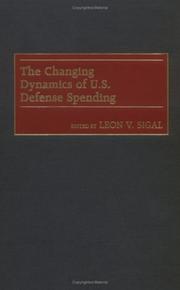| Listing 1 - 4 of 4 |
Sort by
|
Book
ISBN: 0815709897 9780815709893 Year: 1977 Publisher: Washington (D.C.) Brookings Institution
Abstract | Keywords | Export | Availability | Bookmark
 Loading...
Loading...Choose an application
- Reference Manager
- EndNote
- RefWorks (Direct export to RefWorks)

ISBN: 0313028621 0275966402 9780275966409 9780313028625 9798400624537 Year: 1999 Publisher: Westport, Conn. Praeger
Abstract | Keywords | Export | Availability | Bookmark
 Loading...
Loading...Choose an application
- Reference Manager
- EndNote
- RefWorks (Direct export to RefWorks)
A behind-the-scenes look at the environment for US defence policy and budgeting. It shows how the political base for defence spending is eroding and that the economic benefits of defence spending and of foreign military sales are increasingly concentrated.
United States - Armed Forces - Appropriations and expenditures. --- Military & Naval Science --- Law, Politics & Government --- Armies --- United States. --- Appropriations and expenditures. --- United States --- Armed Forces --- D.O.D. --- DOD (Department of Defense) --- Mei-kuo kuo fang pu --- Ministerstvo oborony SShA --- Министерство обороны США --- National Military Establishment (U.S.)
Book
ISBN: 9780801894398 9780801894381 0801894387 0801894395 Year: 2010 Publisher: Baltimore Johns Hopkins University Press
Abstract | Keywords | Export | Availability | Bookmark
 Loading...
Loading...Choose an application
- Reference Manager
- EndNote
- RefWorks (Direct export to RefWorks)
The end of the Cold War was supposed to bring a 'peace dividend' and the opportunity to redirect military policy in the United States. Instead, according to Daniel Wirls, American politics following the Cold War produced dysfunctional defense policies that were exacerbated by the war on terror. Wirls' critical historical narrative of the politics of defense in the United States during this 'decade of neglect' and the military buildup under the cover of the wars in Afghanistan and Iraq explains how and why the U.S. military has become bloated and aimless and what this means for long-term security. Wirls examines the recent history of U.S. military spending and policy under presidents George H.W. Bush, Bill Clinton, and George W. Bush. He finds that although spending decreased from the close of the first Bush presidency through the early years of Clinton's, both administrations preferred to tinker at the edges of defense policy rather than redefine it, leaving the United States with an outdated and underfunded global- and two-war military strategy. Years of political infighting escalated the problem, leading to military policy stalemate as neither party managed to craft a coherent and winning vision of national security. Wirls argues that the United States has undermined its own long-term security through profligate and often counterproductive defense policies while critical national problems have gone unmitigated and unsolved. This unified history of the politics of U.S. military policy from the end of the Cold War through the beginning of the Obama presidency provides a clear picture of why the United States is militarily powerful but 'otherwise insecure'.
Dépenses militaires --- Militaire uitgaven --- Military spending --- National security --- History --- United States. --- Appropriations and expenditures --- United States --- Military policy --- Armed Forces --- Politics and government --- 20th century --- 21st century --- United States. Department of Defense --- National security - United States - History - 20th century --- National security - United States - History - 21st century --- United States - Military policy --- United States - Armed Forces - Appropriations and expenditures --- United States - Appropriations and expenditures --- United States - Politics and government
Book
ISBN: 0446392758 Year: 1990 Publisher: New York, NY Warner Books
Abstract | Keywords | Export | Availability | Bookmark
 Loading...
Loading...Choose an application
- Reference Manager
- EndNote
- RefWorks (Direct export to RefWorks)
#BUAR:bibl.de Bock --- United States --- Armed Forces --- Appropriations and expenditures --- Accounting --- United States. Department of Defense --- Official secrets --- Defense information [Classified] --- Military policy --- Foreign relations --- 1981-1989 --- United States - Armed Forces - Appropriations and expenditures. --- United States - Armed Forces - Accounting. --- United States. Dept. of Defense - Appropriations and expenditures. --- United States. Dept. of Defense - Accounting. --- Official secrets - United States. --- Defense information, Classified - United States. --- United States - Military policy. --- United States - Foreign relations - 1981-1989.
| Listing 1 - 4 of 4 |
Sort by
|

 Search
Search Feedback
Feedback About UniCat
About UniCat  Help
Help News
News